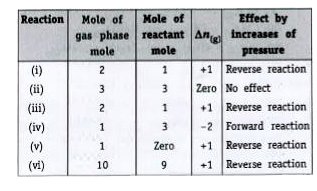Which of the following reactions will get affected by increasing the pressure ? Also, mention whether change will cause the reaction to go into forward or backward direction.
(i)COCl2(g)⇔CO(g)+Cl(2)(g)
(ii)CH4(g)+2S2(g)⇔CS2(g)+2H2S(g)
(iii)CO2(g)+C(s)⇔2CO(g)
(iv)2H2(g)+CO(g)⇔CH3OH(g)
(v) CaCO3(s)⇔CaO(s)+CO2(g)
(vi)4NH3(g)+5O2(g)⇔4NO(g)+6H2O(g)
In chemical equilibrium the components in gases phase and Δn(g)≠0 so, the effect of pressure on reaction.
Only in reaction (ii) Δn(g)≠0 and remaining reaction Δn≠0. So, effect of pressure does not occurs on reaction (ii) and remaining reaction (i), (iii), (iv), (v), (vi) the effect of pressure is occurs.
According to increases in pressure, the forward reaction is (iv), reverse reactions are (i), (ii), (v) an (iv). Note: There is no effect of reaction (ii).
Explain : On increasing pressure reaction moves in such direction moles of gases decreases and new equilibrium is established as per Le Chatelier.s principle. i.e. Δn(g)<0 in that direction reaction is forward.

Topper's Solved these Questions
- EQUILIBRIUMBOOK - KUMAR PRAKASHANCHAPTER - EQUILIBRIUMEXERCISE - SECTION-A Try Your self -2
6 Videos
- EQUILIBRIUMBOOK - KUMAR PRAKASHANCHAPTER - EQUILIBRIUMEXERCISE - SECTION-A Try Your self -3
10 Videos
- ENVIRONMENT CHEMISTRY BOOK - KUMAR PRAKASHANCHAPTER - ENVIRONMENT CHEMISTRY EXERCISE - Question For Module (Section-C)
1 Videos
- HYDROCARBONSBOOK - KUMAR PRAKASHANCHAPTER - HYDROCARBONSEXERCISE - (Questions for Module (Section - D))
1 Videos
Similar Questions
Which of the following reactions will get affected by increasing the pressure? Also, mention whether change will cause the reaction the reaction to go into forward of backward direction.
a. COCl2(g)⇔CO(g)+Cl2(g)
b. CH4(g)+2S2(g)⇔CS2(g)+2H2S(g)
c. CO2(g)+C(s)⇔2CO(g)
d. 2H2(g)+CO(g)⇔CH3OH(g)
e. CaCO3(s)⇔CaO(s)+CO2(g)
f. 4NH3(g)+5O2(g)⇔4NO(g)+6H2O(g)
View SolutionWhich of the following reactions will get affected by increasing the pressure? Also, mention whether change will cause the reaction the reaction to go into forward of backward direction.
a. COCl2(g)⇔CO(g)+Cl2(g)
b. CH4(g)+2S2(g)⇔CS2(g)+2H2S(g)
c. CO2(g)+C(s)⇔2CO(g)
d. 2H2(g)+CO(g)⇔CH3OH(g)
e. CaCO3(s)⇔CaO(s)+CO2(g)
f. 4NH3(g)+5O2(g)⇔4NO(g)+6H2O(g)
View Solution
Knowledge Check
For a reaction C(s)+CO2(g)⇔2CO(g)Δn value is
AThe equlibrium shifts in backward direction if more of CO is addedBThe equilibrium shifts in backward direction if more of CO is addedCThe equlibrium shifts in forward direction if more of corbon is addedDOn adding carbon, the equlibrium is not disturbedFor the reaction :
CaCO3(s)⇔CaO(s)+CO2(g)AKp=p(CaCO3)BKp=p(CO2)CKp=1p(CaCO3)DKp=1p(CO2)For the following three reaction a, b and c, equilibrium constants are given :
(i) CO(g)⋅H2Og⇔CO2(g)⋅H2(g),K1
(ii) CH4(g)⋅H2O(g)⇔CO(g)⋅3H2(g),K2
(iii)CH4(g)+2H2O(g)⇔CO2(g)+4H2(g),K3AK1√K2=K3BK2K3=K1CK3=K1K2DK3.K32=K21
Which of the following reactions will get affected by increasing the pressure? Also, mention whether change will cause the reaction the reaction to go into forward of backward direction.
a. COCl2(g)⇔CO(g)+Cl2(g)
b. CH4(g)+2S2(g)⇔CS2(g)+2H2S(g)
c. CO2(g)+C(s)⇔2CO(g)
d. 2H2(g)+CO(g)⇔CH3OH(g)
e. CaCO3(s)⇔CaO(s)+CO2(g)
f. 4NH3(g)+5O2(g)⇔4NO(g)+6H2O(g)
View SolutionWhich of the following reaction will get affected by increase of pressure? Also mention, whether change will cause the reaction to go into the right or left direction?
(i) CH4(g)+2S2(g)⇔CS2(g)+2H2S(g)
(ii) CO2(g)+C(s)⇔2CO(g)
(iii) 4NH3(g)+5O2(g)⇔4NO(g)+6H2O(g)
(iv) C2H4(g)+H2(g)⇔C2H6(g)
View Solutionwhich of the following reactions will get affected by increase in pressure ? Also mention whether the change will cause the reaction to go the right or left direction.
(i) CH4(g)+2S)2(g)⇔CS2(g)+2H2S(g)
(ii) CO2(g)+C(s)⇔2CO(g)
(iii) 4NH3(g)+5O2(g)⇔4NO(g)+6H2O(g)
(iv) C2H4(g)+H2(g)⇔C2H6(g)
(v) COCI2(g)⇔CO(g)+CI2(g)
(vi) CaCO3(g)⇔CaO(s)+CO2(g)
View SolutionPredict the effect of pressure on the following equilibria :
(i)2Cu(NO3)2(s)⇔2CuO(s)+4NO2(g)+O2(g)
(ii)C(s)+CO2(g)⇔2CO(g)
(iii)I2(g)+5F2(g)⇔2IF5(g)
(iv)FeO(s)+CO(g)⇔Fe(s)+CO2(g)
View SolutionFor the reaction CaCO3(s)⇔CaO(s)+CO2(g)kp is equal to
View Solution
